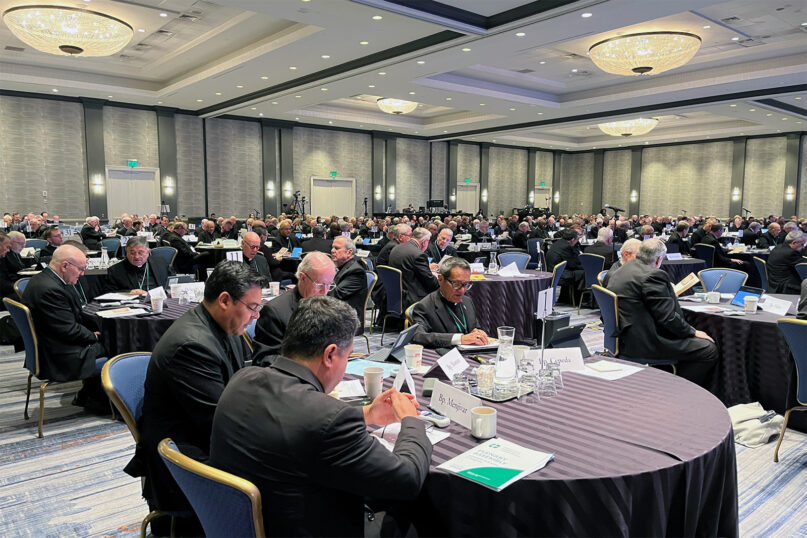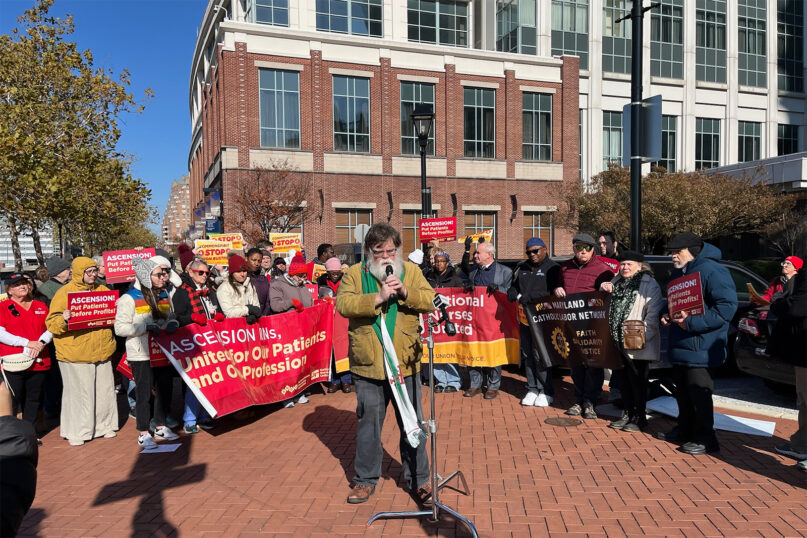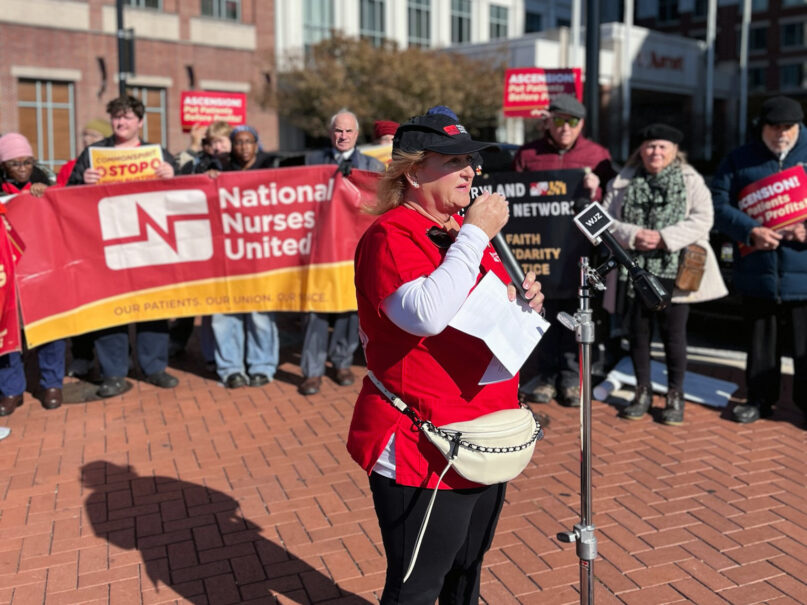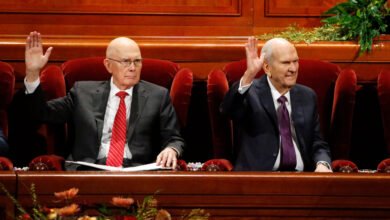Bishops ban trans care at Catholic hospitals, sidestep nurses’ push for better work conditions

BALTIMORE (RNS) — The nurses had hoped this would be the year the U.S. Catholic bishops would listen to their concerns about hospital understaffing that they say lowers standards of care and makes doing their jobs a physical trial.
Instead, the nurses and their supporters gathered outside the harbor-front hotel where the U.S. Conference of Catholic Bishops was holding its annual fall meeting. Braced against a whipping wind off the water, they recounted about staffing issues and union busting at Catholic hospitals.
“ Inside our hospitals, we see indignity every day,” said Monica Gonzalez, a registered nurse at Ascension Seton Medical Center in Austin, Texas. “We see nurses running from room to room, taking on unsafe assignments, skipping breaks, holding our bladders and holding our tears.”
The deprivations, she said, were because Ascension, a Catholic hospital network of 95 medical centers and 30 senior living facilities, “ is putting profits over people.”
When asked for a response, Ascension sent a reply from its nearest affiliated hospital, Ascension St. Agnes in Baltimore. A spokesperson there told Religion News Service, “Our staffing and patient care practices are grounded in evidence-based approaches and flexible staffing models designed to meet the evolving needs of our patients.”
Inside the hotel, the bishops were focused on health care, but not on the nurses’ claims. On the last day of the meeting, the bishops were poised to approve newly amended guidance for moral issues in Catholic health care.

The U.S. Conference of Catholic Bishops meets at the Baltimore Marriott Waterfront hotel, Nov. 11, 2025, in Baltimore. (RNS photo/Aleja Hertzler-McCain)
The new guidance, an update to the Ethical and Religious Directives for Catholic Health Care Services, or ERDs, specifically prohibits Catholic hospitals from medical interventions to help transgender individuals “transform sexual characteristics of a human body into those of the opposite sex (or to nullify sexual characteristics of a human body).”
Transgender Catholics object that the USCCB has failed to meaningfully consult their community. The bishops “really have shown no willingness at all to understand the reality that transgender people are experiencing and to shape our care and ministry around the realities of their lives,” said Marianne Duddy-Burke, executive director of the LGBTQ advocacy organization DignityUSA.
In practice, said Duddy-Burke, a married lesbian and mother to a trans son, Catholics hospitals already had not been providing gender-affirming care.
“ It’s still a grave disappointment,” she said. “ Any kind of barrier to health care just makes it harder for trans people and for lots of other Catholics to feel included in our church. It feels very discriminatory and like our lives and our health just don’t matter to church officials in the same way that other people’s do.”
More than 1 in 7 patients in the United States are cared for in Catholic hospitals, according to the Catholic Health Association. Brooklyn Auxiliary Bishop James Massa, who led the doctrine committee behind the directives, said the group had consulted the Catholic Health Association, the National Catholic Bioethics Center, the Catholic Medical Association, the Alliance of Catholic Health Care and the Vatican’s Dicastery for the Doctrine of the Faith in putting together the new guidance.
Maxwell Kuzma, a Catholic and trans man, said that he felt “so much anxiety for young trans people now.” He explained, “ Being early in your transition and feeling like all the institutions that are supposed to be there to accompany or to support you, to not want you, that’s a really big blow.”
But he feels confident that “ there is a huge diverse, true history of the church that has a place for trans people like me.” Transitioning has been “a spiritual gift” because “ I get to feel more connected to God because I am more myself in my body,” Kuzma said.
“Those who lead in the church are called to care for all of God’s people — without exception. This includes LGBTQ people,” Kuzma said. “As the state moves to restrict transgender care, the church must not join in that harm, but instead defend the dignity and safety of every person.”
Alex Dworak, a family medicine doctor in Omaha, Nebraska, who treats trans youth as part of his practice, said: “ Trans patients already face egregious health disparities in both access to health care and rates of chronic diseases, substance use, mental health conditions and death both by suicide and by being victims of violent crime.
“ This is going to add even more strain to a very underserved, marginalized group at a time when they are facing intense political attack and already struggling far more than the average American,” Dworak said of the bishops’ new guidelines.
“ There’s been a fire hose of misinformation about what trans care is, about why people seek it, and also about the naturalistic fallacy or the biological fallacy that chromosomes and sex and gender are very rigid,” the doctor said.

The Rev. Ty Hollinger speaks during a health care demonstration near the U.S. Conference of Catholic Bishops’ meeting, Nov. 12, 2025, in Baltimore. (RNS photo/Aleja Hertzler-McCain)
The USCCB’s newly elected leadership reflects the conference’s emphasis on opposing “gender ideology” — the idea that sex and gender are not rigid or binary but fluid across a broad spectrum of human sexual experience.
New president Oklahoma City Archbishop Paul Coakley’s latest pastoral letter called the “transgender movement” an “evil infecting our world,” and newly elected vice president Bishop Daniel Flores of Brownsville, Texas, shepherded the initial phases of the new directives when he was chair of the doctrine committee.
At the USCCB meeting, Winona-Rochester, Minnesota, Bishop Robert Barron, who has been a leading voice in the conference on gender and sexuality issues, spoke in support of the changes before they passed. “I think in our culture, where this kind of neo-gnostic anthropology is on display — where the real me is buried deep down inside, the body is there to be manipulated — if we can’t be a bulwark, we should at least be a countersign to that,” he said.
The nurses outside the hotel called on the bishops to enforce existing directives about caring for the poor and to back their union against what they say are union-busting activities at Ascension’s hospitals. Organized through the National Nurses United union, the nurses expanded their efforts this year from a focus on Ascension to join with nurses employed by CommonSpirit, another large Catholic health care system.

Sandy Reding speaks during a health care demonstration organized by National Nurses United, near the U.S. Conference of Catholic Bishops’ meeting, Nov. 12, 2025, in Baltimore. (RNS photo/Aleja Hertzler-McCain)
Marvin Ruckle, a neonatal intensive care unit nurse in Wichita, Kansas, at Ascension Via Christi St. Joseph, was among those who spoke at the rally. “ We need the bishops, we need the pope to listen,” he said. “Ascension, CommonSpirit — they are not following the teachings.”
Kevin Burdinski of the Maryland Catholic Labor Network said apostolic nuncio Cardinal Christophe Pierre, the Vatican’s ambassador in the U.S., declined the nurses’ invitation to a dinner hosted by the network but had sent a message to the nurses. “ His Eminence sincerely appreciates the invitation and the important work your organization carries out in promoting Catholic social teaching in the sphere of labor and economic life,” wrote Pierre, according to Burdinski.
Sandy Reding, a Catholic operating-room nurse at Bakersfield Memorial, a CommonSpirit facility in California, and a president of the California Nurse Association/National Nurses Organizing Committee, said her union had successfully negotiated for safe staffing ratios as well as break nurses — nurses who fill in while those on a shift go to the bathroom or take a lunch break.
At other CommonSpirit hospitals, such as St. Joseph Health Regional Hospital in Bryan, Texas, where Reding is supporting nurses advocating for union representation, “they’re at bare bones,” she said. “It’s dangerous.” She cited a finding that appeared in the Journal of the American Medical Association that for each additional patient a nurse receives, mortality increases 7%.
“ We used to have nuns in the hospital that would provide a moral compass,” Reding said. “And now we have no nuns, and the nurses are the moral compass.”
NNU says that CommonSpirit is harassing and surveilling nurses who promote unionizing, threatening pay and benefit cuts if they unionize and holding captive-audience meetings.
CommonSpirit did not respond to a request for comment. Fort Worth, Texas, Bishop Michael Olson, chair of the conference’s health care issues committee, declined a request for an interview, as did St. Joseph’s diocesan bishop, Daniel Garcia of the Diocese of Austin.
Source link




